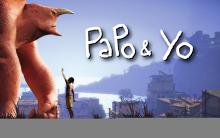Papo & Yo

Papo & Yo is an indie video game telling the story of a boy and his abusive, alcoholic father. In the game, you are a kid in a magical world that has to interact with a monster to solve puzzles. The monster is friendly until he eats a frog, at which point he becomes enraged. In the game, the boy deals with the monster until, at the end, the metaphor is explicitly called out, and the boy gets some closure. Overall, I liked the game a fair amount -- it told a story well, and the conclusion was good -- though I think the game could have been better.
I think that it used video games as a storytelling medium very well in some cases. One thing that is hard to provide in other media is space. If I'm reading a book, the book can't really force me to just take a minute to breathe. A play or video can stop the action for a while, but that just means that you are in a passive state observing non-action rather than being in a passive state observing action. In a video game, you are in control of things, and you always expect to be doing something. Thus, a video game can provide space by preventing you from being able to do anything but sit back and observe as the scenery passes by. Towards the end, Papo & Yo used this to great effect.
It could have used the medium better, though. One of the benefits of videogames as a medium is that you are moving around the protagonist, so you feel responsible for their actions and their effects, and you feel more connected in general. In the game, to advance, you sometimes have to use the frogs to get the monster to move around. This could have been used as a way to make the player feel responsible for the monster's addiction (or something), but the way it was executed made it feel like it was just a game mechanic. Similarly, there are plenty of challenges that a character could overcome in a game that would immerse the player in a particular emotion or experience. Eg, in The Redistricting Game, you are a gerrymanderer, so you learn about gerrymandering because you have done it, and in Anodyne, the ambiance and action are bleak and depressing, so you experience the emotions the game is describing. The mechanics of the game should, themselves, be a part of the story that is told. Papo & Yo's mechanics were not a part of the story. The puzzles were abstract puzzles. Flipping a switch or dragging over a box doesn't make me feel empathy with a child experiencing abuse.
That said, the game makers set out on an ambitious project and made an enjoyable game that told a good story. It was their first game, and I'm sure they learned a lot from it and will apply their learnings to their upcoming game about bullying. I'm happy to have played through it.



